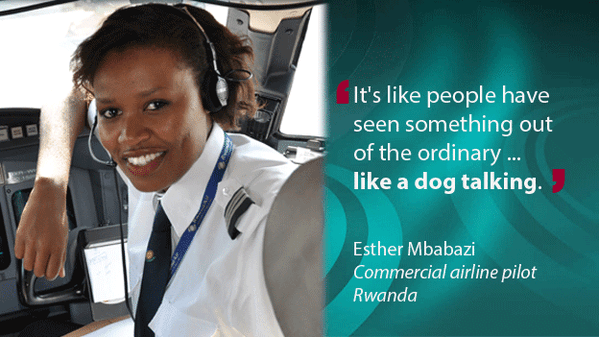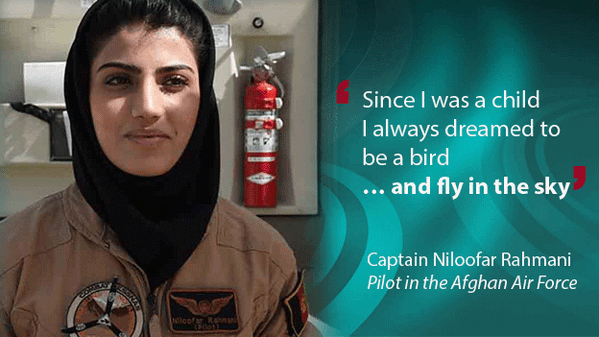Niloofar Rahmani
UPDATE 08/13/15: Captain Niloofar Rahmani has faced multiple threats to herself and her family by the Taliban, and is being forced to quit the Air Force. She told the CBC’s As It Happens: “If I want to stay and if I don't quit, these people will kill some members of my family." She has also received criticism from her own extended family, explaining that they "think I brought shame for the family, because they think I'm not a Muslim anymore." The U.S. military has offered her temporary relocation, and she says she plans to accept the offer.
Niloofar Rahmani is a 23 year-old pilot in the Afghan Air Force — the first woman to serve in the Afghan military since 2001.
She flies cargo planes used to transport dead and wounded soldiers and bring supplies to conflict zones. “Some people get injured; we are carrying them to the capital to get them into good medication hospitals,” Rahmani says.
The young woman inherited her dreams of flight from her father, who was unable to pursue them himself. But flying with the Air Force wasn’t her first choice: “I really wanted to be a commercial pilot. I really searched for it.” Unfortunately, Afghanistan doesn’t have civilian aviation; the military was her only option. Not so in Rwanda.

Esther Mbabazi is a 26-year-old commercial airline pilot in Rwanda, the first woman in her country to do so. Though the restrictions she faced weren’t as strict as Rahmani's — unlike Afghanistan, Rwanda doesn’t have laws that explicitly single out women — Mbabazi had many critics. She recalls some of the objections to her career path: Why would you want to be a pilot, it’s a male field. Women are not a strong as men.
“And then you have to explain to them that flying does not really require you to carry the whole aircraft,” Mbabazi says.
Some people have actually refused to board her flights, because she was in the cockpit. But she isn’t bothered by these complaints: “I say ‘You paid your ticket, so be my guest, you can just jump off, and good luck trying to get a refund.’”
Both women strive to inspire young girls in their countries to follow their own paths into aviation. “I always tell them there’s nothing that is too difficult for women,” Mbabazi stresses. “Anything that can be done by men we can do, probably even better.”
Rahmani agrees. To her friends who ask her how she finds the courage to fly planes, she answers: “It’s not that hard. If you just believe that, you can do anything, because nothing is easy in this world. If you want to achieve something, or if you want to do something, you have to fight.”
Every day, reporters and producers at The World are hard at work bringing you human-centered news from across the globe. But we can’t do it without you. We need your support to ensure we can continue this work for another year.
Make a gift today, and you’ll help us unlock a matching gift of $67,000!
